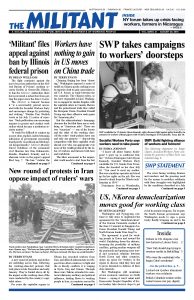The fight continues against the move by prison authorities at the Federal Bureau of Prisons’ medium security facility in Greenville, Illinois, to ban the Militant. Authorities there have prevented a subscriber from getting the paper since the June 11 issue.
The Militant is banned because it “is a newsweekly journal associated with the Socialist Workers Party and encourages change by protesting and striking,” Warden Tom Werlich wrote in his July 12 notice of rejection. “Such publication can encourage inmates to protest and conduct work strikes which become a institution security matter.”
“It would be difficult to conjure up a more clear, explicit, indeed stunning admission of government censorship based purely on political and ideological disagreements,” Militant attorney David Goldstein of the prominent civil liberties law firm Rabinowitz, Boudin, Standard, Krinsky and Lieberman wrote in the paper’s appeal filed Aug. 7. The ban “violates the Militant’s rights to due process and equal protection,” he stated. It “must be reversed, and the rejected issues delivered to the inmate subscriber.”
Articles featured in the banned issues report on a strike of rail workers in Canada, by truck drivers in Brazil, protests against the shooting of a Black youth in Pittsburgh, and a rally in Ohio against threats to the pensions of retired coal miners and Teamsters.
“The Militant has been delivered to inmates in the Federal prison system at least since the 1950s,” Goldstein wrote. “To our knowledge, no Federal prison has ever refused delivery of any issue of the Militant to any inmate (with one exception involving USP Florence, CO, in 2014, which rejection was reversed)” on appeal.
Federal Bureau of Prisons regulations explicitly state, Goldstein quotes, “The Warden may not establish an excluded list of publications.”
‘Flagrant attack on First Amendment rights’
“Banning the Militant is a flagrant attack on First Amendment rights of freedom of speech and the press,” said Militant editor John Studer. “If not reversed it would set a dangerous precedent for impounding the Militant and other publications whose views prison officials dislike from the entire federal prison system.
“Workers behind bars have the right to read the political views they want, including about the struggles of workers and farmers,” he said. “It helps them be part of the world and their class.”
“By refusing to allow prisoners to read the Militant’s reports of current prison conditions and protests around the country,” Karin Deutsch Karlekar of PEN America wrote in a letter calling for overturning the ban, “Federal Bureau of Prisons is censoring the communication of facts and opinions which everyone has the right to consider for themselves.”
The Militant is asking supporters of free speech and the rights of workers behind bars to send letters demanding reversal of the ban against the Militant at the Greenville federal prison to Regional Director Sara M. Revell, Federal Bureau of Prisons, Gateway Complex Tower II, 8th floor, 400 State Avenue, Kansas City, KS 66101-2492.
Censorship in Florida
In another move to censor the paper, two subscribers behind bars in Florida at the Union Correctional Institution informed the Militant they haven’t received any issues of the paper for months. Neither the inmates nor the Militant have received any notice or explanation why, a violation of state prison regulations.
“The Militant requests that the withheld issues be immediately delivered to the inmate subscribers,” Militant attorney David Goldstein wrote to the prison’s warden August 2, “or that Union provide the Militant with the required notices of impoundments or rejections, so that the Militant may appeal the decisions to the Department of Corrections Literature Review Committee.”
The overwhelming majority of rejections of the Militant in Florida, Goldstein noted, have been overturned on appeal.
Among those who have spoken out against prison censorship of the Militant are the American Civil Liberties Union, National Lawyers Guild, Amnesty International, PEN America and prisoner rights, church and other organizations.

